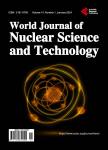Assessment of Axial Power Peaking Factors in GHARR-1 LEU Core: A Decadal Simulation Analysis
Assessment of Axial Power Peaking Factors in GHARR-1 LEU Core: A Decadal Simulation Analysis作者机构:Department of Mathematics and Statistics Ho Technical University Ho Ghana Department of Nuclear Engineering Graduate School of Nuclear and Allied Sciences University of Ghana Accra Ghana Nuclear Regulatory Authority Accra Ghana National Nuclear Research Institute Accra Ghana
出 版 物:《World Journal of Nuclear Science and Technology》 (核科学与技术国际期刊(英文))
年 卷 期:2024年第14卷第1期
页 面:72-85页
学科分类:07[理学] 070202[理学-粒子物理与原子核物理] 0702[理学-物理学]
主 题:GHARR-1 Power Peaking Factor Nuclear Reactor Safety Low Enriched Uranium Core Operational Longevity Thermal Hydraulics
摘 要:This study aims to thoroughly investigate the axial power peaking factors (PPF) within the low-enriched uranium (LEU) core of the Ghana Research Reactor-1 (GHARR-1). This study uses advanced simulation tools, like the MCNPX code for analysing neutron behavior and the PARET/ANL code for understanding power variations, to get a clearer picture of the reactor’s performance. The analysis covers the initial six years of GHARR-1’s operation and includes projections for its whole 60-year lifespan. We closely observed the patterns of both the highest and average PPFs at 21 axial nodes, with measurements taken every ten years. The findings of this study reveal important patterns in power distribution within the core, which are essential for improving the safety regulations and fuel management techniques of the reactor. We provide a meticulous approach, extensive data, and an analysis of the findings, highlighting the significance of continuous monitoring and analysis for proactive management of nuclear reactors. The findings of this study not only enhance our comprehension of nuclear reactor safety but also carry significant ramifications for sustainable energy progress in Ghana and the wider global context. Nuclear engineering is essential in tackling global concerns, such as the demand for clean and dependable energy sources. Research on optimising nuclear reactors, particularly in terms of safety and efficiency, is crucial for the ongoing advancement and acceptance of nuclear energy.



